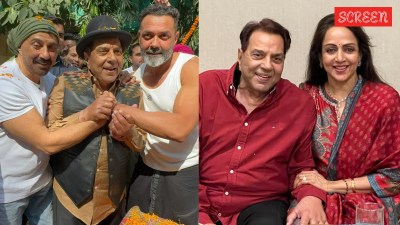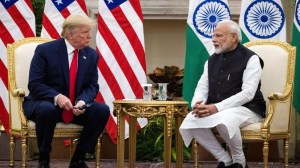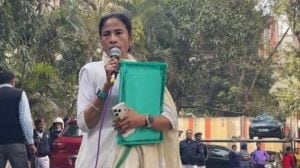Unwelcome home truths
The dynamic Tourism Minister, Renuka Chowdhury, has several new schemes to attract visitors from abroad, but many of her ideas cannot be put...

The dynamic Tourism Minister, Renuka Chowdhury, has several new schemes to attract visitors from abroad, but many of her ideas cannot be put into operation because of the lack of cooperation from other ministries, which are responsible for the infrastructure.
The home ministry, in particular, which provides the manpower for the immigration desks and the security force for the airports, adopts a stick-in-the-mud approach.
For instance, the GoM headed by Arjun Singh on Tourism is yet to meet though it was set up in July simply because the home ministry is still dragging its feet.
In a bid to persuade the home ministry to cut down the red tape at the airport, Chowdhury even collected arrival forms from airports all over the world to demonstrate how easy the immigration questionnaire has become internationally. In contrast, foreigners arriving in India still have to fill out a long list of unnecessary questions, which Chowdhury points out, are more suitable for a marriage application rather than a simple visit to the country.
Chowdhury has hired private firms to train the staff at airports to adopt a more welcoming approach, beginning with a smile for each visitor. To demonstrate this point, the trainees were shown video clips of grim immigration officers at the entry points grumpily stamping passports.
No repeat performance
The MDMK chief, Vaiko, called on Prime Minister Manmohan Singh and Sonia Gandhi last week to register his protest over reports that the Ministry of External Affairs is preparing the draft of a new India-Sri Lanka joint accord. The last time an accord was signed was in 1987, and it triggered off a major LTTE offensive against India culminating in the assassination of Rajiv Gandhi. Vaiko believes that it is National Security Adviser J N Dixit, who, as high commissioner in Sri Lanka, was responsible for the earlier accord, is behind the present initiative as well.
Vaiko warned that if India goes through with the agreement it would unnecessarily alienate all Tamils in Sri Lanka. He went back to Chennai satisfied that the two Congress leaders sympathised with his viewpoint.
Expert at face-lift
Haryana Chief Minister Om Prakash Chautala, who faces a tough Assembly election early next year, has hired retired Principal Information Officer Ram Mohan Rao to give him a face-lift in the media. Rao, in fact, is often hired for crisis management in media relations. On his retirement as PIO in 1992, he was put in charge of the media for Kashmir, a state which has a notorious reputation for human rights violations. A stint in Trinidad and Tobago was followed by his appointment as media adviser to the former Punjab Chief Minister, Prakash Singh Badal. Subsequently, he was called to restructure the Defence Ministry8217;s media handling in the wake of the Kargil war. George Fernandes, who took a hammering in the Tehelka affairs, inducted him as his personal media adviser when he returned as defence minister.
Kissa kursi ka
MDMK MP L Ganesan walked up to the front of the Lok Sabha to discuss a problem in his constituency with Home Minister Shivraj Patil. He sat down innocently on the seat next to Patil, not realising that he had committed a major protocol breach. RJD MP Raghunath Jha was the first to raise a hue and cry that an unknown MP was occupying the chair reserved exclusively for the PM, the first seat in the first row. Speaker Somnath Chatterjee tried to mollify tempers by terming the incident unfortunate. Ganesan who is a first-time MP took some seconds to realise that the MPs were all protesting against his behaviour before he beat a hasty retreat to his own seat.
Gained in translation
The bloomer in the BJP press note which referred to Sushma Swaraj as Sushma Gandhi was the handiwork of Sudheendra Kulkarni, the BJP8217;s star speech writer. Since the note was a criticism of the Congress8217;s extravagant media campaign felicitating Sonia Gandhi on her birthday, the faux pas was particularly embarrassing. Some BJP men complain privately that such goof-ups are bound to happen if Kulkarni, a workaholic, insists on being ghostwriter for both Vajpayee and Advani as well as drafting the party8217;s resolutions and preparing summaries of BJP meetings for the media. Besides, Kulkarni, a control freak, does not feel that anyone needs to check his copy.
A more serious concern is that Kulkarni sometimes adds to his draft ideas which do not emanate from those on whose behalf he does the ghostwriting. For instance, in Advani8217;s recent speech to the national executive, he used the term 8216;8216;instrument of the divine8217;8217;, which caused much comment. It seems Advani was not consulted in advance. Another Kulkarni expression which Advani used recently and puzzled many was the description of Karnataka as 8216;8216;a low hanging fruit8217;8217;. Presumably he meant the southern state was ripe for picking by the BJP. On an earlier occasion, Advani wanted to emphasise the dangers of encouraging illegal migration in his speech, but he did not expect that his speechwriter would include the strong rider that this could herald the second Partition of the country. Kulkarni even wanted a line that the UPA8217;s National Advisory Council be abolished to be included in a press note. This observation was detected in time and removed when it was pointed out that the NAC was hardly the BJP8217;s concern.
- 01
- 02
- 03
- 04
- 05































